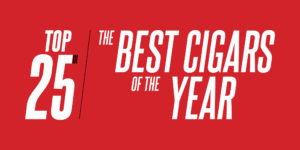Interview by Nicolás Antonio Jiménez, Photo by Manny Iriarte
Can you remember your first cigar?
I’m 63, and I was 14 years old when I smoked my first cigar, which means I’ve been smoking cigars for 49 years nonstop. In my opinion, of course, Fuente is the best, of course. I like Opus X, but mainly what I smoke every day is Don Carlos … the Don Carlos Robusto.
Nonstop? How often do you smoke?
Me? I smoke every day! [laughter] I smoke every day, man. I get up in the morning and I get my Cuban coffee and light the first one. Sometimes I smoke two or three in a day. Sometimes a little more. Sometimes a little less. No less than two and no more than four.
Has smoking cigars ever affected your ability to play?
You know, everybody makes comments about it and has been asking me about it for many, many years. They want to know how come I smoke cigars because I use a lot of air in my work.
I’m telling you, I cannot smoke cigarettes. Cigarettes really bother me. Even second-hand smoke. If I’m around someone smoking cigarettes, I feel it bother my breathing. But with cigars, I have never had any problems.
You’re very close to Carlito Fuente. Tell me about that relationship.
Carlito is not a friend to me. He is not even family. I don’t know how to describe it. He is the real brother my parents unfortunately couldn’t give me. He’s a real brother. That friendship is so big, besides any business, beside the music, besides cigars — there’s a mutual sympathy, and we connected so well from the first mo- ment we met.
He’s a guy with a big heart. Very humble. A gentleman. I call him a renaissance man. He puts so much enthusiasm into everything he does. He’s a guy who is always looking for charities, looking for benefits, for things to help people in need. That means a lot. He’s a guy I admire and respect.
We met in the Dominican Republic, when they were launching a cigar magazine called El Cigarro. That was many years ago. We met then in a little cigar store. Since that day, we connected so well. And I became real close to his family. His dad is like a brother to me. His mother, his sister, his brother in law, his kids, his wife. Everybody. We became like close family.
You’ve also worked with the Fuentes’ charity, the Cigar Family Charitable Foundation. Are you giving back in any other ways?
I also have my own institute: The Arturo Sandoval Institute. It’s dedicated to helping kids with parents of low incomes to buy instruments and help them to learn music. We’re working hard and I’m very happy about it because it’s so good for your soul when you feel you are giving back, because God gave so many things to me. God has been so good to me. It’s a spiritual necessity to feel you are giving back.
For so many years, I’ve been giving scholarships to kids who really need it. It’s very good for your soul.
You live in California — not the most cigar-friendly state. Do you have any thoughts on the taxation and regulation of cigars there?
Of course! It’s an invasion of our rights, because it’s not fair when they create taxes that are very aggressive. It’s an abuse of the law, you know? They’re talking about legalization of marijuana. How come the people who are thinking about the legalization of marijuana are so strongly against cigars? That doesn’t make sense. What do you mean? That marijuana’s better than cigars?
Give me a break. They put the taxes so high. It’s amazing. It’s outrageous. People who really love cigars are going to keep buying, but it’s going to affect their pockets immensely. I wish I had the answers. We could protest. We could raise our voices and let the federal government know we’re not happy about it.
What are you working on now? You’ve been spending a lot of time in the studio over the last several days.
I’m working on my next project, but I prefer not to talk about it yet, because it’s too premature. I would like to mention the last two records (“Dear Diz – Every Day I Think of You” & “Tango – Como Yo Te Siento”), which are still kind of new. The last two records won a few Grammys and another is also nominated now for the Grammys in February.
What level of excitement do you still feel when you’re nominated for or win Grammys? There aren’t too many people who have been through that as many times as you have.
The recognition of the Academy… it’s very, very important because that means a lot of things. That means they really paid attention to the product; they really lis- tened to it carefully. And if they really decide to nominate it and even to award it, it’s something that’s always really rewarding for the artist because you feel that what you did was well received.
It gives you a lot of desire and energy for your next project.
Are there things in music that have you particularly excited? Any new artists who have caught your eye?
I love all kinds of music. For me there is only one kind of music: the good kind. I try to stay aware of what is going on in the music industry. There’s always someone new, but I consider myself an old-timer. I still listen to a lot of Ella Fitzgerald, Frank Sinatra and Nat King Cole. I listen to a satellite radio station called Siriusly Sinatra. I listen to that a lot.
And also I listen to the jazz station, of course.




